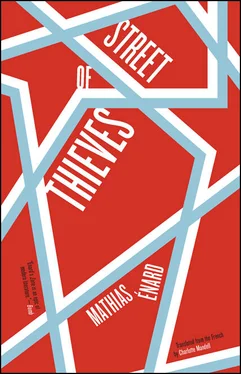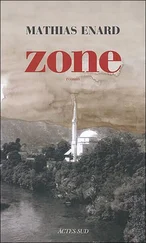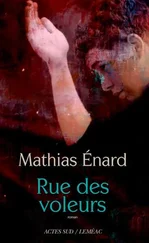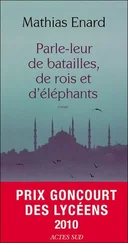Of course there were the police. I had left my fingerprints everywhere, even on the bottle of poison, I was the king of dunces.
I gathered my things together and put them in a pretty ridiculous looking yellow and blue Cádiz soccer club sport bag that I found in the shed.
Anguish was becoming more remote. I avoided glancing one last time at Cruz, stroked the dogs for a long time to say goodbye to them, and left to wait for the bus.
Alittle later on in his travels, when he’s in the city of Bolghar, Ibn Battuta wants to visit the Land of Darkness, mentioned in the legend of Alexander the Great; he finally decides not to go there when he learns that in order to reach it you need a sled drawn by huge dogs, to cross the ice that surrounds it — he will be content to hear talk of it, to learn that the fur merchants trade for skins from its mysterious inhabitants, who live in total night: “After forty days of crossing this desert of ice, the travelers reach the Land of Darkness. The merchants leave large bags of merchandise some distance from their camp. The next day, they return to inspect their bags and discover in place of their things the skins of martens, squirrels, and ermines. If they like the skins, they take them, and if not, they leave them there for one more night. In that case the inhabitants of the Land of Darkness increase the quantity of furs or, if they don’t agree with the terms of exchange, replace the travelers’ merchandise. That is how one does business in the Land of Darkness, and the people who go there don’t know if they’re dealing with men or djinns, for they never see a soul.”
I left Algeciras with the sensation that the world was empty, peopled exclusively by phantoms that appeared at night to die or kill, to leave or take, without ever seeing each other or communicating with each other, and in the long night of the bus that brought me to Barcelona, city of Fate and Death, I had the terrible impression of crossing into the Land of Darkness, the real darkness, our own, and the further the bus advanced into obscurity on the highway in the middle of the desert, between Almeria and Murcia, the deeper the horror I had just witnessed seeped into me; Cruz’s face, moist and purple in its contractions, appeared to me among the flashes of truck headlights, in the midst of the reflections on my window.
Cruz was among the shadows, and so was I.
Unable to close my eyes, pursued by funereal images, bodies shriveled by the sea and the face of Cruz projecting his agony onto me, I waited for the liberation of dawn, when the bus was already drawing closer to Alicante.
III. THE STREET OF THIEVES
Iarrived in Barcelona on March 3 rd—I had left Tangier more than four months before. I didn’t know where to go. I must have looked like the poorest of the poor in my green parka and with my ’80s sport bag, haggard eyes, thick beard — if the cops ever arrested and searched me, I’d have trouble justifying the thousands of euros in cash I was carrying. Sheikh Nureddin’s money, Cruz’s cash, as if God always arranged to give me the means for my travels; I ate from the hand of Fate.
The bus went down Avinguda Diagonal, Diagonal Avenue, palm trees caressed the banks, the noble buildings of past centuries were reflected in the glass and steel of modern skyscrapers, the yellow and black taxis were countless wasps scattering at the sound of the bus’s horn; elegant and disciplined pedestrians waited patiently at the crossroads, without using their superiority in numbers to invade the road; the cars themselves respected the zebra crossings and, stopping carefully at a blinking yellow light, let those traveling on foot cross when their turn came. The shop windows all looked luxurious to me; the city was intimidating but, despite my fatigue, finally arriving filled me with a new energy, as if the huge sparkling phallus of that multicolored skyscraper of the Torre Agbar over there in the distance, that pagan divinity, were transmitting its strength to me.
I blinked my eyes in the noon light and picked up my bag; the station serving points north, Estació del Nord, was apparently adjacent to a large park; a little lower down near the sea was the station for France, and then, to the right, the harbor. I found a phone booth and called Judit; she answered, and when I heard her voice I began crying like a kid, I must have been so exhausted. I said it’s me, it’s Lakhdar, I’m in Barcelona. She seemed happy to hear me, despite my sniveling; she asked me where I was, I replied at the Estació del Nord; she said she’d meet me not far from there, in a neighborhood called the Born, and then she added no, that’s complicated, you’ll never find it, don’t move, I’ll come get you, give me a quarter of an hour. I said thank you, thank you, and I hung up, I was overcome with a kind of dizzy spell and had to sit down on the ground, next to the phone booth. I thanked God, I said a brief prayer, and felt a little ashamed at addressing Him.
I stayed like that, my eyes closed, my head in my hands, for minutes on end, before gathering my wits. I wanted to look strong when Judit arrived — I felt dirty, as if I stank of corpses, the morgue, hatred; I hadn’t seen her since last summer, was she going to recognize me?
And then the energy of the Torre Abgar returned to me.
The energy of desire.
The first minutes were very strange.
We didn’t kiss, but smiled; we were both equally embarrassed. We exchanged a few banalities, she stared at me from head to toe, without coming to any conclusion — or at least, without revealing any of her conclusions; she just said, you want to have lunch? Which seemed a bizarre question to me, I answered yes, why not, and we began walking toward the center of town.
I told her about my last weeks with Cruz, obviously without mentioning the horrible end. She sympathized, and my cowardliness was such that I wanted her to feel sorry for me, to soften her. Seeing her again made my heart pound; I had only one desire, that she take me in her arms; I wanted to lie down next to her, right up against her, and sleep like that, in her warmth, for at least two days. On the way we had passed a triumphal arch in red brick that opened onto a wide promenade bordered with palm trees and elegant buildings. I secretly hoped the place where we were going wouldn’t be too chic, I didn’t want to be ashamed of my clothing. Fortunately she brought me to a bar on a pretty, quiet, shaded little square. I had to force myself to eat.
I couldn’t bring myself to ask Judit any questions, at least not the ones I wanted to ask; I questioned her about Barcelona, about the geography of the city, the neighborhoods, no personal questions; it all was terribly artificial. She avoided looking me in the eyes. Sadness began to invade me. I felt as if the ground were disappearing beneath my feet, time became thick, something heavy and tangible, Judit’s face seemed to have gotten darker, she had cut her hair, which made her look tougher. She spoke to me mostly of current politics; of the crisis in Europe, its harshness, of unemployment, of poverty that was coming back, as if from the depths of Spanish history, she said, of conflicts, racism, tensions, the insurrection that was being prepared. She had gotten very involved in the Movement of the Indignants, for some months. Also very involved in the Spanish Occupy movement, los Okupas, she said. Repression had never been so violent. The other day a twenty-year-old student lost an eye from being hit with a rubber bullet when the cops broke up a peaceful sit-in, she said. Spain is heading for its end, Europe too. Ultra-liberal propaganda would have us believe we can’t resist the diktat of the markets. Here they won’t take care anymore of the poor, the old, the foreigners. Right now the revolution is delayed because of soccer, Real, Barça; but when that’s not enough to make up for frustration and poverty, then there’ll be riots, she said.
Читать дальше












